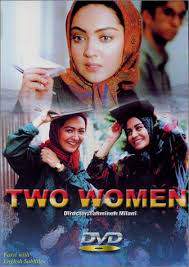Two Women 2000

Set in 1979 Iran, the film follows two determined architecture students struggling against the restrictive policies of the emerging regime. As they pursue their dreams, they encounter the harsh realities of a society suppressing women's voices and aspirations. The story explores the challenges they face, the traditions they must confront, and the silencing of women through domestic violence, presenting a powerful and honest portrayal of systemic oppression.
Does Two Women have end credit scenes?
No!
Two Women does not have end credit scenes. You can leave when the credits roll.
Meet the Full Cast and Actors of Two Women
Explore the complete cast of Two Women, including both lead and supporting actors. Learn who plays each character, discover their past roles and achievements, and find out what makes this ensemble cast stand out in the world of film and television.
No actors found
External Links and Streaming Options
Discover where to watch Two Women online, including streaming platforms, rental options, and official sources. Compare reviews, ratings, and in-depth movie information across sites like TMDb, Wikipedia, Rotten Tomatoes or Metacritic.
Ratings and Reviews for Two Women
See how Two Women is rated across major platforms like IMDb, Metacritic, and TMDb. Compare audience scores and critic reviews to understand where Two Women stands among top-rated movies in its genre.

66
Metascore
tbd
User Score

48
%
User Score
Take the Ultimate Two Women Movie Quiz
Challenge your knowledge of Two Women with this fun and interactive movie quiz. Test yourself on key plot points, iconic characters, hidden details, and memorable moments to see how well you really know the film.
Two Women Quiz: Test your knowledge on the emotional and historical journey of Cesira and Rosetta in 'Two Women'.
What is the name of Cesira's daughter?
Rosetta
Giovanni
Michele
Clara
Show hint
Full Plot Summary and Ending Explained for Two Women
Read the complete plot summary of Two Women, including all major events, twists, and the full ending explained in detail. Explore key characters, themes, hidden meanings, and everything you need to understand the story from beginning to end.
In the war-ravaged streets of Rome, Cesira (Loren), a widowed shopkeeper, bears the heavy burden of caring for her 12-year-old daughter Rosetta (Brown), whose unwavering faith mirrors her mother’s strength. As the Allied forces embark on a relentless bombing campaign, the duo seeks refuge in their homeland, Ciociaria, a rugged and picturesque mountain region in central Italy, filled with memories of their past. On the eve of their departure, Cesira shares a poignant farewell with Giovanni (Vallone), a local coal merchant dedicated to minding her shop during her absence.
Once they arrive in Ciociaria, Cesira’s path intertwines with that of Michele (Belmondo), a captivating young intellectual who aligns himself with communist doctrines. Rosetta quickly forms a bond with Michele, viewing him as a surrogate father whose wisdom offers them both comfort amid the chaos. However, the turmoil of war soon claims Michele, as German soldiers capture him and force him to navigate the perilous landscape as their guide.
As June 1944 dawns, the Allies reclaim Rome, and Cesira and Rosetta return to the city, only to face an unspeakable horror as they are assaulted inside a church by Moroccan Goumiers—soldiers allied with the willing forces. This traumatic encounter irreversibly changes Rosetta, stripping her of her childhood innocence and creating an emotional chasm between her and Cesira.
In the wake of the attack, they find temporary shelter in a nearby village, but panic ensues when Rosetta disappears one night, leaving Cesira desperate with worry. It is subsequent to this that Cesira learns of Michele’s tragic fate at the hands of the Germans. When Rosetta eventually returns, she brings unsettling news of an older boy who has gifted her silk stockings, signaling a complex maturity and heavy burden of sorrow. Cesira’s reaction is one of profound disappointment as she lashes out at her daughter, who seems to be retreating into a shell of emotional numbness, trapped in her trauma. Only when Cesira reveals Michele’s death does Rosetta’s facade begin to crumble, leading to a tearful embrace that evokes the deep scars that remain etched by the brutality of war, reminding them both of the fragility of innocence in a world marred by conflict.
Uncover the Details: Timeline, Characters, Themes, and Beyond!

Coming soon on iOS and Android
The Plot Explained Mobile App
From blockbusters to hidden gems — dive into movie stories anytime, anywhere. Save your favorites, discover plots faster, and never miss a twist again.
Sign up to be the first to know when we launch. Your email stays private — always.
Discover Film Music Concerts Near You – Live Orchestras Performing Iconic Movie Soundtracks
Immerse yourself in the magic of cinema with live orchestral performances of your favorite film scores. From sweeping Hollywood blockbusters and animated classics to epic fantasy soundtracks, our curated listings connect you to upcoming film music events worldwide.
Explore concert film screenings paired with full orchestra concerts, read detailed event information, and secure your tickets for unforgettable evenings celebrating legendary composers like John Williams, Hans Zimmer, and more.


Two Women Other Names and Titles
Explore the various alternative titles, translations, and other names used for Two Women across different regions and languages. Understand how the film is marketed and recognized worldwide.
Quick Links: Summary, Cast, Ratings, More

What's After the Movie?
Not sure whether to stay after the credits? Find out!
Explore Our Movie Platform
New Movie Releases (2026)
Famous Movie Actors
Top Film Production Studios
Movie Plot Summaries & Endings
Major Movie Awards & Winners
Best Concert Films & Music Documentaries
Movie Collections and Curated Lists
© 2026 What's After the Movie. All rights reserved.













